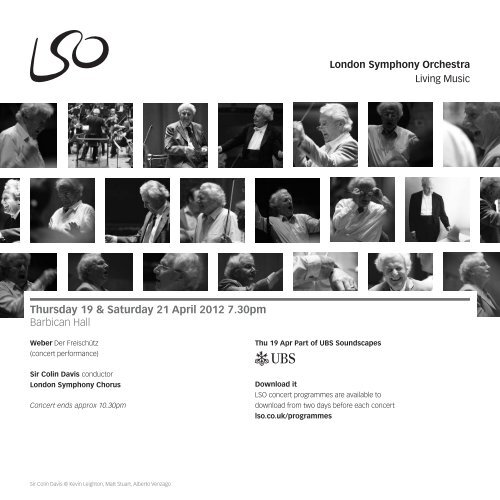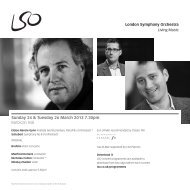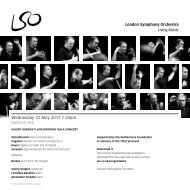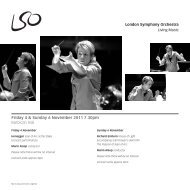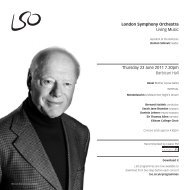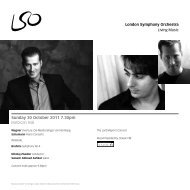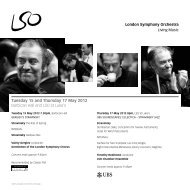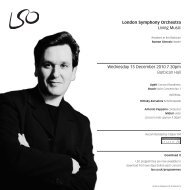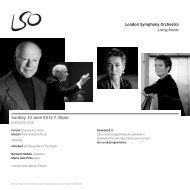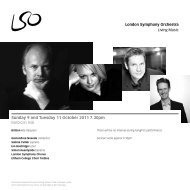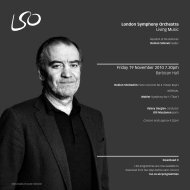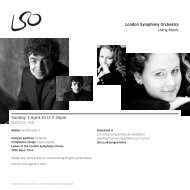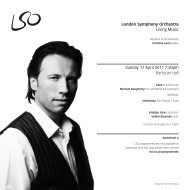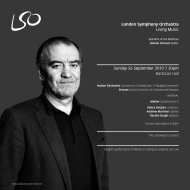19 & 21 April programme PDF - London Symphony Orchestra
19 & 21 April programme PDF - London Symphony Orchestra
19 & 21 April programme PDF - London Symphony Orchestra
Create successful ePaper yourself
Turn your PDF publications into a flip-book with our unique Google optimized e-Paper software.
Thursday <strong>19</strong> & Saturday <strong>21</strong> <strong>April</strong> 2012 7.30pm<br />
Barbican Hall<br />
Weber Der Freischütz<br />
(concert performance)<br />
Sir Colin Davis conductor<br />
<strong>London</strong> <strong>Symphony</strong> Chorus<br />
Concert ends approx 10.30pm<br />
Sir Colin Davis © Kevin Leighton, Matt Stuart, Alberto Venzago<br />
Thu <strong>19</strong> Apr Part of UBS Soundscapes<br />
Download it<br />
LSO concert <strong>programme</strong>s are available to<br />
download from two days before each concert<br />
lso.co.uk/<strong>programme</strong>s<br />
<strong>London</strong> <strong>Symphony</strong> <strong>Orchestra</strong><br />
Living Music
Welcome News<br />
Welcome to tonight’s concert performance of Weber’s Der Freischütz<br />
conducted by LSO President, Sir Colin Davis. Weber’s opera works<br />
are particular favourites of Sir Colin, and no more so than this one<br />
which is regarded by many as a landmark in German Romantic opera.<br />
Tonight’s concert performance provides an opportunity to hear the<br />
exquisite and expressive detail present in Weber’s score.<br />
It is a pleasure to welcome the cast for these performances: Christine<br />
Brewer, Simon O’Neill, Falk Struckmann, Stephan Loges, Martin<br />
Snell, Sally Matthews, Gidon Saks, Marcus Farnsworth, Lucy Hall and<br />
our narrator Malcolm Sinclair, a number of whom have previously<br />
appeared with Sir Colin in various operas.<br />
I would like to take the opportunity to thank LSO Principal Partner<br />
UBS for supporting the performance on Thursday <strong>19</strong> <strong>April</strong> as part of<br />
our ongoing partnership, UBS Soundscapes.<br />
I hope you enjoy tonight’s performance and can join us again in the<br />
next few weeks. Peter Eötvös conducts concerts on 29 <strong>April</strong> and<br />
8 May featuring music by Debussy, Bartók and Szymanowski, with<br />
the violinists Christian Tetzlaff and Nikolaj Znaider.<br />
Kathryn McDowell<br />
LSO Managing Director<br />
<strong>London</strong> 2012<br />
As part of the <strong>London</strong> 2012 celebrations, the LSO will perform in<br />
three special collaborative concerts at the Barbican. The first is with<br />
iconic South American singer-songwriter Gilberto Gil and conductor<br />
François-Xavier Roth, performing Gil’s own songs and works from<br />
his homeland of Brazil (4 July). On <strong>21</strong> July award-winning composer<br />
and producer Nitin Sawhney will conduct the <strong>Orchestra</strong> in his newly<br />
written score for Hitchcock’s The Lodger, restored to its former glory<br />
by the BFI National Archive and being screened in the concert hall.<br />
Finally on 25 and 26 July jazz trumpeter Wynton Marsalis joins Sir<br />
Simon Rattle and the LSO with Jazz at Lincoln Center <strong>Orchestra</strong> for two<br />
concerts which premiere Marsalis’ ‘Swing <strong>Symphony</strong>’ (<strong>Symphony</strong> No 3).<br />
lso.co.uk/whatson<br />
Latest release on LSO Live: Rachmaninov Symphonic Dances<br />
Valery Gergiev’s Rachmaninov Symphonic Dances is the latest release<br />
on LSO Live this <strong>April</strong>. Gergiev couples the Symphonic Dances with<br />
another work by a Russian émigré to the United States – Stravinsky’s<br />
<strong>Symphony</strong> in Three Movements. It was written between <strong>19</strong>42–45 and<br />
was the first piece Stravinsky completed after his arrival in the US.<br />
The Guardian wrote of the recording, ‘Gergiev’s upfront delivery of its<br />
[Symphonic Dances] striking ideas and dark fantastical manner was<br />
impeccably assured’.<br />
lso.co.uk/lsolive<br />
Music’s better shared!<br />
The LSO offers great benefits for groups of 10+ including 20% off<br />
standard ticket prices, a dedicated Group Booking phone line and<br />
priority booking, free interval hot drinks and, for bigger groups,<br />
the chance of a private interval reception. To reserve tickets, call<br />
the dedicated Group Booking line on 020 7382 7<strong>21</strong>1. If you have<br />
general queries, please call LSO Groups Rep Fabienne Morris on<br />
020 7382 2522. At tonight’s concert, we are delighted to welcome:<br />
Dartmouth College (US)<br />
2 Welcome & News Kathryn McDowell © Camilla Panufnik
The value of an investment and the income from it can fall as well as rise as a result of market and currency<br />
fluctuations and you may not get back the amount originally invested.<br />
© UBS 2011. All rights reserved.<br />
Until we’re perfectly in tune.<br />
Harmony is only achieved when everyone’s in tune.<br />
And to be in tune, you have to listen.<br />
At UBS, we know all about listening.<br />
To the words. The silences.<br />
Yes, we offer tailor-made investment solutions.<br />
And we can put the expertise and resources of a<br />
truly integrated, global firm at your disposal.<br />
But all that would mean nothing if we didn’t listen.<br />
We will not rest<br />
To you.<br />
www.ubs.com
Carl Maria von Weber (1786–1826)<br />
Der Freischütz (18<strong>21</strong>)<br />
Sir Colin Davis conductor<br />
Stephan Loges<br />
Ottokar, Duke of Bohemia / Zamiel, the dark hunter bass-baritone<br />
Martin Snell Kuno, head gamekeeper bass<br />
Christine Brewer Agathe, the daughter of Kuno soprano<br />
Sally Matthews Ännchen, a young cousin of Agathe soprano<br />
Falk Struckmann Kaspar, a gamekeeper bass-baritone<br />
Simon O’Neill Max, a gamekeeper tenor<br />
Gidon Saks A hermit bass<br />
Marcus Farnsworth Kilian, a rich peasant baritone<br />
Lucy Hall Four Bridesmaids soprano<br />
Malcolm Sinclair Narrator<br />
<strong>London</strong> <strong>Symphony</strong> Chorus<br />
An opera in three acts by Carl Maria von Weber with a libretto in<br />
German by Friedrich Kind and tonight performed with English surtitles<br />
translated by Aidan Lang, and English narration by Amanda Holden.<br />
Bohemia; the middle of the 17th century.<br />
Kuno, the head Ranger, is soon to retire. Having no male heir, he has<br />
settled the succession on Max, a young forester betrothed to Kuno’s<br />
daughter Agathe. Max has only to pass the Trial Shot; but his skill has<br />
suddenly deserted him. Without knowing it he has come under the<br />
evil influence of his jealous colleague Kaspar, who has sold his soul to<br />
Zamiel the demonic Black Huntsman. Kaspar has marked Max down<br />
as the victim, the substitute who will earn him a further term of life.<br />
The action begins on the eve of the day when Kaspar must meet<br />
Zamiel, and Max, his nerve shaken, fire the Trial Shot.<br />
4 Programme Notes<br />
Overture<br />
ACT ONE<br />
A clearing in the forest, in front of an inn, towards evening;<br />
a shooting match is just ending.<br />
1 Introduction: ‘Victoria! der Meister soll leben’<br />
March, Song (Kilian) with chorus<br />
The peasants acclaim Kilian, who has beaten Max.<br />
Narration<br />
March, Song (Kilian) with chorus<br />
Peasants, marching in procession and led by the village<br />
band, celebrate the victory. Kilian taunts Max, and all join in<br />
jeering at him.<br />
Narration<br />
2 ‘O diese Sonne!’<br />
Trio (Max, Kaspar, Kuno), chorus of peasants and huntsmen<br />
Max laments the ill-luck that dogs him; how will he bear the loss<br />
of Agathe? Kuno and the peasants urge him to trust in God.<br />
Huntsmen enter the clearing, impatient for the hunt.<br />
Narration<br />
3 Waltz – Recitative: ‘Nein, länger trag’ ich nicht die Qualen’<br />
Aria: ‘Durch die Wälder, durch die Auen’<br />
Max<br />
Kilian tries to persuade Max to join their dance, but he refuses.<br />
Alone, but watched by Zamiel, he gives way to despair.<br />
He remembers his careless delight in the life of the woods and<br />
in Agathe’s love, and imagines her now, watching for him at her<br />
window, longing for news of his victory. But some dark power<br />
controls his destiny.<br />
Narration
4 Song: ‘Hier im ird’schen Jammerthal’<br />
Kaspar<br />
Kaspar, protesting friendship, sings a drinking song and,<br />
ignoring Max’s anger, insists on his joining him in toasts to<br />
Agathe and the Prince.<br />
Narration<br />
5 Aria: ‘Schweig! damit dich Niemand warnt’<br />
Kaspar<br />
Kaspar exults in Max’s coming destruction, and calls on the<br />
powers of darkness to complete their work.<br />
ACT TWO<br />
An anti-chamber in the hunting lodge.<br />
1 Duet: ‘Schelm, halt fest! Ich will dich’s lehren’<br />
Agathe, Ännchen<br />
Ännchen hammers a nail into the wall and hangs the portrait<br />
of Kuno’s ancestor, which has just fallen, hitting Agathe.<br />
She makes light of the incident, but Agathe, who longs for<br />
Max’s return, sees it as an omen.<br />
Narration<br />
2 Arietta: ‘Kommt ein schlanker Bursch gegangen’<br />
Ännchen<br />
Ännchen tries to distract her and instil some of her own gaiety.<br />
Narration<br />
3 Scene and Aria: ‘Wie nahte mir der Schlummer,<br />
bevor ich ihn geseh’n’<br />
Agathe<br />
By the open window, Agathe waits for Max. She kneels in the<br />
moonlight and prays for him. Suddenly she sees him coming<br />
through the trees, a feather in his hat: he has won! Her fears<br />
are drowned in overwhelming joy.<br />
Narration<br />
4 Trio: ‘Wie? Was? Entsetzen! Dort in der Schreckensschlucht’<br />
Agathe, Ännchen, Max<br />
Agathe, learning that Max is going to the Wolf’s Glen to retrieve<br />
the giant eagle he shot, entreats him not to go: it is an evil place.<br />
Max dissembles his agitation: danger is normal in a huntsman’s<br />
life. Ännchen at first laughs at Agathe’s fears, then joins her in<br />
warning Max.<br />
Narration<br />
5 Finale: ‘Milch des Mondes fiel aufs Kraut’<br />
Kaspar, Zamiel, Max, chorus of spirits and wild hunstmen<br />
The Wolf’s Glen. Invisible voices prophesy the death of a bride.<br />
Midnight strikes. Kaspar invokes Zamiel and bargains with him:<br />
he has found another victim. Max appears on a high crag and,<br />
as he descends, sees the ghost of his mother, warning him,<br />
and the figure of Agathe seeming to throw herself down a<br />
foaming cataract. Kaspar casts the bullets, calling them out<br />
one by one, his cry echoing from the rocks. One: birds hop out<br />
of the darkness. Two: a black boar charges across the glen.<br />
Three: a storm, tearing trees up by the roots. Four: cracking of<br />
whips, baying of dogs, galloping hooves, flaming wheels.<br />
Five: the Wild Hunt. Six: two storms meet in the upper air.<br />
Seven: the Black Huntsman. He holds Max in his grasp.<br />
Max crosses himself. Zamiel vanishes. A distant clock strikes one.<br />
INTERVAL: 20 minutes<br />
Programme Notes<br />
5
ACT THREE<br />
Entr’acte<br />
Narration<br />
1 Cavatina: ‘Und ob die Wolke sie verhülle’<br />
Agathe<br />
In her room, though oppressed by sadness, Agathe kneels and<br />
prays: God will call her to be a bride, in heaven if not on earth.<br />
Narration<br />
2 Romance and Aria: ‘Einst träumte meiner sel’gen Base’<br />
Ännchen<br />
Ännchen makes fun of Agathe’s fears and mocks the imagined<br />
horrors with a tale about a dog mistaken for a ghost.<br />
3 Folksong: ‘Wir winden dir den Jungfernkranz’<br />
Chorus (Bridesmaids)<br />
The bridesmaids adorn Agathe for her wedding.<br />
Narration<br />
4 ‘Hier oben in den Asten’<br />
Chorus (Huntsmen)<br />
In an open space, with tents – in one of which Prince Ottokar<br />
and his courtiers are feasting – his men regale themselves and<br />
praise the life of the huntsman.<br />
Narration<br />
5 Finale: ‘Schaut, o schaut’<br />
All are horror-struck. But Agathe is not dead; she wakes from<br />
a deep faint. The Hermit has turned aside the bullet. Thwarted,<br />
Zamiel directed it to Kaspar. Zamiel, unseen, rises up and claims<br />
his soul. Kaspar dies, cursing his master. Max confesses his guilt<br />
and is condemned to exile. But the Hermit intercedes and<br />
persuades the Prince to show mercy. The Trial Shot is abolished.<br />
Max is given a year’s probation, at the end of which he can<br />
marry Agathe and become Ranger. He dedicates himself to<br />
expiation of his guilt. Agathe and the people give thanks to God.<br />
6 Programme Notes<br />
24 June to 15 July 2012<br />
City of <strong>London</strong> Festival is delighted to<br />
celebrate its 50th birthday with the LSO<br />
Box Office 0845 120 7502 | colf.org<br />
Festival sponsor<br />
Mon 25 & Tue 26 Jun 8pm, St Paul’s Cathedral<br />
LSO at St Paul’s with Sir Colin Davis<br />
Berlioz Requiem (Grande Messe des morts)<br />
Sir Colin Davis conductor | Barry Banks tenor<br />
<strong>London</strong> <strong>Symphony</strong> <strong>Orchestra</strong><br />
<strong>London</strong> <strong>Symphony</strong> Chorus<br />
Tickets £5 £10 £15 £<strong>21</strong> £32 £45 £50<br />
25 Jun sponsored by BNY Mellon<br />
26 Jun sponsored by Mizuho International plc<br />
Wed 27 Jun 7.30pm, Goldsmiths’ Hall<br />
LSO Brass Quintet<br />
A <strong>programme</strong> of golden music including<br />
Francisco Coll, J S Bach, Ewald, Jim Parker, Gershwin & Fats Waller<br />
LSO Brass Quintet<br />
Timothy Jones horn | Philip Cobb trumpet | Niall Keatley trumpet<br />
Dudley Bright trombone | Patrick Harrild tuba<br />
Tickets £10 £20 (inc glass of wine)<br />
Francisco Coll’s world premiere of A Golden Fanfare is<br />
commissioned by the Worshipful Company of Goldsmiths
Carl Maria von Weber<br />
Der Freischütz: About the Music<br />
Weber’s evergreen masterpiece has had a chequered career. First<br />
performed in Berlin in 18<strong>21</strong>, it created a sensation rarely equalled in<br />
the annals of opera and quickly became the supreme expression of<br />
German Romanticism, the symbol par excellence of the contemporary<br />
quest for national identity (as well as a popular work outside Germanspeaking<br />
lands). In that respect its advent was perfectly timed; it came<br />
most carefully upon its hour.<br />
Its subsequent history has been less fortunate. By the middle of the<br />
<strong>19</strong>th century a sacred monument in its native country – part of the<br />
Wagnerian blood-and-soil conception of the German spirit – it had<br />
begun to lose its appeal elsewhere and to appear dated and even<br />
absurd. Its co-option in the 20th century as an instrument of Nazi<br />
ideology led in turn to a reaction and, in the years following the<br />
World War II, it was reinvented in Marxist terms or interpreted as a<br />
parable of existential despair or, alternatively, sent up as a naïve<br />
fairytale ripe for ridicule. To quote the American scholar and<br />
Freischütz-celebrator Donald Henderson, the work is regularly<br />
subjected to productions which ‘pit the illusions of its librettist and<br />
composer against the realities demanded by life today’. There is<br />
seemingly no end to the indignities visited on it.<br />
In a concert performance we can happily forget such fatuities and<br />
give ourselves freely to the delights of this perennial score. In any<br />
case, what is reality? Great artists re-make it. They create their own<br />
reality – and Weber does so in Der Freischütz. His music-drama is so<br />
vivid that the vision of the German forest world in the time following<br />
the horrors of the Thirty Years War – its customs and enjoyments, its<br />
daily habits, its superstitions, its hopes and fears, its terrors, its belief<br />
in the supernatural and in the power of evil and the possibility of good –<br />
becomes totally real.<br />
Der Freischütz is an opera of unforgettable ‘sounds and sweet airs’:<br />
Max’s lyrical evocation of the woods and meadows in the days of<br />
his happiness; the intense impression of moonlight on Agathe’s<br />
balcony and the light wind moving among the pines; the peasants’<br />
mocking laughter, their homely waltz fading into the dusk; the lovely<br />
lilt of Agathe’s and Ännchen’s A major duet; Ännchen’s merriment;<br />
Kaspar’s vicious piccolos; the baleful colour of clarinets in their lowest<br />
register, contrasted with the genial glow of the huntsmen’s horns,<br />
representatives of the struggle at the heart of the opera; and then<br />
the Wolf’s Glen and the evocative power of Weber’s orchestra, the<br />
sinister, hopping birds, the rushing cataract, the fury of the storm.<br />
Never before had music pictured nature and the natural world and<br />
human beings’ immersion in it with such freshness and mastery.<br />
Two centuries later, it rings as bright and true as ever.<br />
Programme Note and Synopsis © David Cairns<br />
Programme Notes<br />
7
Carl Maria von Weber (1786–1826)<br />
Composer Profile<br />
Born in Holstein (North Germany) on 18 November 1786, Carl Maria<br />
von Weber was the eldest of three children to Franz Anton and<br />
Genovefa; both his parents were musical. Despite beginning a career<br />
as a military officer, his father was discharged from the militia and<br />
took up a number of musical directorships thereafter, including founding<br />
a theatre company in Hamburg. His mother was a Viennese singer.<br />
Weber had four musically gifted cousins on his father’s side, one of<br />
whom was Constanze Weber, who married Wolfgang Amadeus Mozart<br />
in August 1782, a catalyst in Franz’s ambitions of making the young<br />
Weber into a child prodigy like his cousin-in-law.<br />
A gifted violinist, Weber’s father taught the boy music and gave<br />
him a comprehensive education. In 1798 Weber went to<br />
Salzburg to study with Michael Haydn, younger brother of<br />
Joseph. That same year saw Weber’s first published work –<br />
six fughettas for piano. At the age of 14 his family moved to<br />
Freiburg where he wrote his first opera, The Silent Forest<br />
Maiden; it later went on to be produced in Freiburg, and<br />
then performed in Vienna, Prague and St Petersburg. The<br />
latter half of the first decade of the century was marred<br />
with troubles for Weber – debt, an ill-fated affair, his father<br />
misappropriated a vast amount of money – however, he<br />
remained a prolific composer.<br />
Things brightened up from 1810; he visited several cities<br />
and spent time as Director of Opera in Prague, Director of<br />
Opera in Dresden and also worked in Berlin promoting<br />
and establishing German opera. The successful premiere<br />
of Der Freischütz in Berlin in 18<strong>21</strong> led to performances<br />
all over Europe. His next opera, Euryanthe, was another<br />
success and in the year of its premiere (1823) he was<br />
invited to the Royal Opera, Covent Garden, to compose<br />
and produce Oberon, which premiered in 1826.<br />
Whilst in <strong>London</strong>, Weber was already suffering from<br />
tuberculosis, which then took hold entirely. He died at the house<br />
of Sir George Smart during the night of 4/5 June 1826. Buried in<br />
<strong>London</strong>, his remains were transferred 18 years later to the family<br />
vault in Dresden.<br />
8 Programme Notes
Performer’s Perspective<br />
from the <strong>London</strong> <strong>Symphony</strong> Chorus<br />
With Der Freischütz being such a mysterious opera,<br />
we thought we would get an insight into the supernatural<br />
story and what it’s like to sing.<br />
Fabienne Morris talked to a member of the <strong>London</strong> <strong>Symphony</strong><br />
Chorus, who will be providing the vocal backbone to the work.<br />
Soprano Jane Morley tells all …<br />
What can an audience expect musically from Der Freischütz?<br />
Folk music, hunting horns and ‘the most expressive rendering of the<br />
gruesome that is to be found in a musical score’!<br />
What’s your favourite part?<br />
Being a ghost, definitely. As a chorus member you get to be jolly and/<br />
or aghast bystanders pretty regularly. Playing dead is rare (and a treat).<br />
Der Freischütz is an intense opera – pacts with the devil<br />
and the like. Do you ‘get into character’ when performing?<br />
Well that’s certainly the idea. If you believe what you’re singing<br />
then that should come across in the performance. Having said that,<br />
of course, Der Freischütz is one of those operas that requires a<br />
substantial suspension of disbelief.<br />
Is it challenging?<br />
Every piece is challenging in its way. There are quite a lot of mood<br />
shifts in Der Freischütz, as with most operas, but the main challenge<br />
is putting across a lot of German text at high speed, but retaining<br />
the clarity.<br />
What’s it like to perform an opera minus the theatrical element?<br />
From the pure perspective of performance, it makes things easier in a<br />
way – you can just concentrate on the music, without worrying about<br />
movement or potential distractions like demonic marksmen, ghosts<br />
and assorted birdlife. Of course, that means that you have to work<br />
twice as hard to put the emotions across to the audience.<br />
How does it feel to work under a conductor like Sir Colin?<br />
It’s always a joy and a privilege to work with Sir Colin. Leaving aside<br />
his wisdom and authority, his facial expressions as he encourages us<br />
all on are just a treat.<br />
Do you enjoy working with the LSO on projects like these?<br />
Absolutely. The LSO is such a virtuosic group that I’m sure we’ll hear<br />
every detail of the score.<br />
And finally, if you had to describe the Der Freischütz score<br />
in three words, what would they be?<br />
Bang on target!<br />
LSC Interview<br />
9
Sir Colin Davis<br />
Conductor<br />
‘Whenever Colin Davis<br />
conducts … the effect is<br />
serene. There’s a palpable<br />
sense of direction.’<br />
Martin Kettle on Sir Colin Davis & the LSO<br />
The Guardian, December 2011<br />
President of the <strong>London</strong> <strong>Symphony</strong><br />
<strong>Orchestra</strong> since 2006, and before that<br />
Principal Conductor from <strong>19</strong>95, Sir Colin<br />
Davis performs regularly with the LSO at<br />
the Barbican and on tour, and features on<br />
many LSO Live recordings. He is Honorary<br />
Conductor of the Dresden Staatskapelle and<br />
appears regularly at the Royal Opera House,<br />
Covent Garden. 2010 saw Sir Colin made<br />
Conductor Emeritus of the English Chamber<br />
<strong>Orchestra</strong>.<br />
A highlight of Sir Colin’s 2011/12 season<br />
was the completion last December of his<br />
widely acclaimed Nielsen Symphonies Cycle<br />
and Beethoven Piano Concerto series with<br />
Mitsuko Uchida and the LSO. For the 2010/11<br />
season, Sir Colin began in Dresden where<br />
he conducted the Dresden Staatskapelle,<br />
before spending the autumn in <strong>London</strong><br />
working with the LSO. He visited the New<br />
York Philharmonic to perform Mahler’s Des<br />
Knaben Wunderhorn with Ian Bostridge and<br />
Dorothea Röschmann, before returning to the<br />
Royal Opera House for Mozart’s The Magic<br />
Flute. He also spent July with the LSO in<br />
Aix-en-Provence where they performed<br />
Mozart’s La clemenza di Tito. Sir Colin<br />
conducted two BBC Proms concerts last<br />
summer: one with the Gustav Mahler Youth<br />
<strong>Orchestra</strong> and the other with the LSO,<br />
performing Beethoven’s Missa Solemnis.<br />
Sir Colin Davis has recorded widely with<br />
Philips, BMG and Erato. His LSO Live disc of<br />
Walton’s <strong>Symphony</strong> No 1 and Belshazzar’s<br />
Feast with the LSO was released in February,<br />
following Nielsen’s Symphonies Nos 4 and 5<br />
and Verdi’s Otello (nominated for a 2011<br />
Gramophone award in the Opera category).<br />
Beethoven’s Mass in C, Haydn’s The Creation<br />
and a boxed set of Sibelius’ Symphonies Nos<br />
1–7 and Kullervo were released last season.<br />
During his career Sir Colin conducted the<br />
BBC Scottish <strong>Symphony</strong> <strong>Orchestra</strong>, moving<br />
to Sadler’s Wells Opera House in <strong>19</strong>59. He<br />
spent <strong>19</strong>67–71 as Chief Conductor of the BBC<br />
<strong>Symphony</strong> <strong>Orchestra</strong>, became Music Director<br />
of the Royal Opera House Covent Garden in<br />
<strong>19</strong>71 and Principal Guest Conductor of the<br />
Boston <strong>Symphony</strong> <strong>Orchestra</strong> in <strong>19</strong>72. He spent<br />
<strong>19</strong>83–92 with the Bavarian Radio <strong>Symphony</strong><br />
<strong>Orchestra</strong>, was Principal Guest Conductor of<br />
the New York Philharmonic from <strong>19</strong>98–2003<br />
and has been Honorary Conductor of the<br />
Dresden Staatskapelle since <strong>19</strong>90.<br />
Sir Colin has been awarded international<br />
honours by Italy, France, Germany and<br />
Finland. He was named a Member of the<br />
Order of the Companions of Honour in the<br />
Queen’s Birthday Honours in 2001. Sir Colin’s<br />
recording of Sibelius’ Kullervo <strong>Symphony</strong><br />
received a BBC Music Magazine Award in<br />
2007. He received The Queen’s Medal for<br />
Music in December 2009 and an Honorary<br />
Doctorate for Music from Cambridge<br />
University in 2011.<br />
10 The Artists Sir Colin Davis © Gautier Deblonde
Stephan Loges<br />
Ottokar / Zamiel (bass-baritone)<br />
Born in Dresden, Stephan was the<br />
winner of the <strong>19</strong>99 Wigmore Hall<br />
International Song Competition.<br />
He has given recitals throughout<br />
the world, including Wigmore Hall<br />
(<strong>London</strong>), Carnegie Hall (New York),<br />
Concertgebouw (Amsterdam),<br />
Klavierfestival Ruhr La Monnaie,<br />
(Brussels), Schleswig-Holstein<br />
Festival, Santiago de Compostela<br />
and the Vocal Arts Series in Washington with pianists Roger Vignoles,<br />
Simon Lepper, Alexander Schmalcz and Eugene Asti.<br />
He has sung with the Melbourne <strong>Symphony</strong>, <strong>London</strong> <strong>Symphony</strong>,<br />
Swedish Radio <strong>Symphony</strong>, Leipzig Gewandhaus, Russian National,<br />
Zurich Tonhalle, Iceland <strong>Symphony</strong>, Salzburg Mozarteum and Scottish<br />
Chamber orchestras, Semperoper Dresden and <strong>Orchestra</strong> del Maggio<br />
Muiscale in Florence, and with many period instrument groups<br />
including the Gabrieli Consort and the Academy of Ancient Music.<br />
Current and future plans include Mauregato in Schubert’s Alfonso<br />
und Estrella with the Mozarteum Orchester (Salzburg) and Ivor Bolton<br />
at the Vienna Konzerthaus; Bach Mass in B Minor in Leipzig with<br />
The English Concert; St Matthew Passion with the Handel and Haydn<br />
Society of Boston; Haydn’s The Seven Last Words of Christ on the<br />
Cross with the Bergen Philharmonic <strong>Orchestra</strong>; Bruckner Requiem<br />
with The Northern Sinfonia and Thomas Zehetmair; Mozart Coronation<br />
Mass and Haydn Stabat Mater with the Ensemble <strong>Orchestra</strong>l de Paris<br />
and Fabio Biondi; Argenio in Handel’s Imeneo on a European tour and<br />
Messiah in <strong>London</strong>, both with the Academy of Ancient Music, and a<br />
recital at Wigmore Hall.<br />
Stephan has appeared with Théâtre Royal de la Monnaie in Brussels,<br />
Berlin Staatsoper, Royal Opera Covent Garden, Opera North, Opéra<br />
National du Rhin in Strasbourg, and at the Edinburgh Festival.<br />
Stephan was a member of the Dresden Kreuzchor before studying at<br />
the Hochschule der Künste Berlin and the Guildhall School in <strong>London</strong>.<br />
Stephan Loges © Ana Alvarez Prada<br />
Martin Snell<br />
Kuno (bass)<br />
The Swiss/New Zealand bass<br />
Martin Snell studied singing with<br />
Patrick McGuigan at the Royal<br />
Northern College of Music in<br />
Manchester, and gained his first<br />
professional stage experiences at<br />
the International Opera Studio in<br />
Zurich. He has been a resident<br />
artist with Theater St Gallen,<br />
Theater Basel and Luzerner Theater.<br />
Since August 2005 he has worked as a freelance performer based in<br />
Lucerne, Switzerland.<br />
As both a concert and opera singer Martin has performed widely<br />
throughout Europe as well as Asia and his native New Zealand<br />
with conductors such as Bertrand de Billy, Herbert Blomstedt,<br />
Sir Colin Davis, Peter Eötvös, Howard Griffiths, Philippe Herreweghe,<br />
René Jacobs, Philippe Jordan, David Parry, Peter Schneider, Thomas<br />
Hengelbrock, Morten Schuldt Jensen, Wolfgang Katchner, Jirˇí Kout,<br />
Jeffery Tate, Alexander Polianichko, Lan Shui and Sebastian Weigle,<br />
among many others. He has performed at the Bayreuth Festival,<br />
where he was most recently heard as Hermann Ortel in Die<br />
Meistersinger von Nürnberg, Reinmar von Zweter in Tannhäuser,<br />
and Ein Steuermann in Tristan and Isolde.<br />
Additionally, his most recent performance successes include Hunding<br />
in Die Walküre with the RSO Berlin and Marek Janowski on tour in<br />
Spain, Mahler’s <strong>Symphony</strong> No 8 with the Sydney <strong>Symphony</strong> <strong>Orchestra</strong><br />
and Vladimir Ashkenazy in Australia and New Zealand, Kuno in Stefan<br />
Ruzowitzky’s production of Weber’s Der Freischütz under Bertrand<br />
de Billy at the Theater an der Wien, Ariodate in Handel’s Xerxes in<br />
New Zealand, and recently Ein Notar and cover for Baron Ochs in<br />
Der Rosenkavalier conducted by Philippe Jordan at La Scala, Milan,<br />
Handel’s Messiah in the Sydney Opera House and Stravinsky’s<br />
Oedipus Rex (Téresias) in New Zealand.<br />
Future plans include a return to Bayreuth in 2012, opera productions<br />
in Strasbourg and Vienna, and concert appearances in Denmark,<br />
Germany, Spain, Switzerland and New Zealand.<br />
The Artists<br />
11
Christine Brewer<br />
Agathe (soprano)<br />
Christine Brewer was born in Illinois<br />
and began her professional career<br />
with Opera Theatre of Saint Louis<br />
where she has performed Ellen<br />
Orford, Donna Anna and the title<br />
roles in Ariadne auf Naxos, Haydn’s<br />
Armida and Britten’s Gloriana.<br />
She has sung Countess (New York<br />
City Opera and Covent Garden);<br />
Donna Anna (Edinburgh Festival<br />
and in <strong>London</strong>, New York and Florida); Iphigenie en Tauride in Madrid;<br />
Leonore in Fidelio in Lisbon and San Francisco; Weber’s Oberon in<br />
<strong>London</strong> and Die Aegyptische Helena, Peter Grimes and Alceste in<br />
Santa Fe. She sang Isolde with the BBC <strong>Symphony</strong> <strong>Orchestra</strong> and<br />
Donald Runnicles, the Los Angeles Philharmonic and Esa-Pekka<br />
Salonen and at the Edinburgh Festival with Jonathan Nott; Gloriana<br />
with Richard Hickox at the Aldeburgh Festival; and Chrysothemis<br />
(Elektra) with the Cleveland <strong>Orchestra</strong> and Franz Welser-Möst. She has<br />
sung the Färberin (Die Frau ohne Schatten) in Chicago and at the Paris<br />
Opera, and Ariadne for English National Opera, Opera de Lyon (Lyon<br />
and Paris), Santa Fe and at the Metropolitan Opera.<br />
Brewer appears with the major American and European orchestras<br />
under Norrington, Tilson Thomas, Masur, Dohnanyi, Litton, Nelson,<br />
Marriner, Sawallisch, Robertson, Mehta, Pappano and Rattle. Her many<br />
recordings include Don Giovanni under Charles Mackerras, Barber’s<br />
Vanessa under Leonard Slatkin, Fidelio with Sir Colin Davis, Britten’s<br />
War Requiem with Kurt Masur, Verdi’s Requiem under Sir Colin Davis,<br />
Mahler’s Eighth <strong>Symphony</strong> under Simon Rattle, Strauss’ Four Last<br />
Songs with Donald Runnicles, and Schubert and Strauss recitals.<br />
Brewer’s European concert appearances include the Concertgebouw<br />
and Bayerische Rundfunk <strong>Orchestra</strong>s with Mariss Jansons, the BBC<br />
<strong>Symphony</strong> <strong>Orchestra</strong> with Jirˇí Bělohlávek, the <strong>London</strong> Philharmonic<br />
<strong>Orchestra</strong> with Vladimir Jurowski, the LSO with Sir Colin Davis and<br />
the Accademia Santa Cecilia with Antonio Pappano. Brewer is the<br />
recipient of the BBC Radio 3 Listener’s Award of the 2008 Royal<br />
Philharmonic Society Awards.<br />
Sally Matthews<br />
Ännchen (soprano)<br />
Sally Matthews was the winner of<br />
the <strong>19</strong>99 Kathleen Ferrier Award.<br />
She studied at the Guildhall School,<br />
was a member of the Royal Opera<br />
Young Artist <strong>programme</strong> and was<br />
part of the BBC New Generation<br />
Artists scheme. She currently<br />
studies with Paul Farringdon.<br />
Current and future highlights<br />
include Countess in The Marriage of<br />
Figaro for the Glyndebourne Festival and Royal Opera, Covent Garden;<br />
the title role in Handel Deidamia for Netherlands Opera; Blanche at<br />
the Bayerische Staatsoper, Munich as well as Mahler <strong>Symphony</strong> No 2<br />
and Beethoven <strong>Symphony</strong> No 9 with the Berlin Philharmonic and<br />
Sir Simon Rattle; Poulenc Gloria with the <strong>Orchestra</strong> dell’Academia<br />
Nazionale di Santa Cecilia, Rome and Antonio Pappano, and Mendelssohn<br />
Lobesgesang with the Mahler Chamber <strong>Orchestra</strong>. She will also give<br />
recitals in <strong>London</strong>, Amsterdam and Stuttgart, with Simon Lepper.<br />
Sally has sung with all the UK orchestras and throughout Europe in<br />
concerts with conductors including Sir Simon Rattle, Bernard Haitink,<br />
Robin Ticciati, Lorin Maazel, Kent Nagano, Daniel Harding, Seiji Ozawa,<br />
Antonio Pappano, Michael Tilson Thomas and Sir Colin Davis.<br />
Appearances at Covent Garden have included Fiordiligi in Così fan<br />
tutte; Sifare in Mitridate and Anne Truelove in The Rake’s Progress;<br />
at Bayerische Staatsoper, Cavalli’s La Calisto, the title role in Unsuk<br />
Chin’s Alice in Wonderland, Blanche in Les Dialogues des Carmélites<br />
and Governess in The Turn of the Screw. She recently made her<br />
Vienna Staatsoper debut singing Donna Anna in Don Giovanni.<br />
Recent concert highlights have included Brahms Requiem with<br />
Bernard Haitink and the Chamber <strong>Orchestra</strong> of Europe, Strauss Four<br />
Last Songs with Robin Ticciati and the Bamberg <strong>Symphony</strong> <strong>Orchestra</strong><br />
and Schumann Paradies und die Peri with the Berlin Philharmonic and<br />
Bayerische Rundfunk orchestras, both with Sir Simon Rattle.<br />
12 The Artists Christine Brewer © Christian Steiner, Sally Matthews © Johan Persson
Falk Struckmann<br />
Kaspar (bass-baritone)<br />
Falk Struckmann was born in<br />
Heilbronn, Germany. He has<br />
recently taken part in productions<br />
of The Flying Dutchman, Lohengrin,<br />
Meistersinger von Nürnberg, The<br />
Ring, Parsifal, Fidelio and Elektra,<br />
Salome and Wozzeck.<br />
In the <strong>19</strong>90s Struckmann made<br />
his debut at La Scala, Milan, as<br />
Siegfried under Riccardo Muti and<br />
at the New York Met as Wozzeck under James Levine. He has sung in<br />
numerous premieres especially at the Vienna State Opera including<br />
The Flying Dutchman, Lohengrin, Die Frau ohne Schatten and Otello.<br />
Falk Struckmann holds the honorary title of Kammersänger at both<br />
the Berlin and the Vienna State Opera. After his debut at the Bayreuth<br />
Festival in <strong>19</strong>93, as Kurwenal (Tristan und Isolde) in a production<br />
of Heiner Müller, he also sang The Ring under James Levine and<br />
under Christian Thielemann in 2006, as well as Parsifal. Struckmann<br />
appeared in Tristan und Isolde and Duke Bluebeard’s Castle at the<br />
Salzburg Festival. He made his <strong>London</strong> debut in Parsifal at the Royal<br />
Opera Covent Garden, in The Flying Dutchman at the Paris Opera and<br />
also sang in Tristan und Isolde and The Ring under Bertrand de Billy at<br />
the Liceu in Barcelona.<br />
In recent years, Falk Struckmann is increasingly active at the Hamburg<br />
State Opera and Vienna State Opera. Most recently he sang at La Scala<br />
as Barak in Die Frau ohne Schatten. This season Struckmann will make<br />
his role debut as Gurnemanz in a new production of Parsifal at the<br />
Nederlandse Opera in Amsterdam under the baton of Ivan Fischer.<br />
Falk Struckmann works with leading conductors and stage directors<br />
including Daniel Barenboim, James Levine, Christian Thielemann,<br />
Bertrand de Billy, Simone Young, Kirill Petrenko, Claudio Abbado,<br />
Riccardo Muti and Ivan Fischer.<br />
Simon O’Neill<br />
Max (tenor)<br />
A native of New Zealand, Simon<br />
O’Neill has rapidly established<br />
himself as one of the leading heldentenors<br />
on the international stage.<br />
Notable debuts have included:<br />
Siegmund in Die Walküre at La Scala<br />
and the Berlin Staatsoper with<br />
Daniel Barenboim; the Bayreuth<br />
Festival in the title roles of<br />
Lohengrin with Andris Nelsons<br />
and Parsifal with Daniele Gatti; the Metropolitan Opera in Idomeneo<br />
with James Levine; the Royal Opera House in The Bartered Bride<br />
with Charles Mackerras; the Salzburg Festival in The Magic Flute with<br />
Riccardo Muti, and the Vienna Staatsoper as Parsifal with Christian<br />
Thielemann.<br />
At extremely short notice Simon made his debut in the title role of<br />
Verdi’s Otello in concert at the Barbican with the <strong>London</strong> <strong>Symphony</strong><br />
<strong>Orchestra</strong> conducted by Sir Colin Davis (2009). His performance<br />
was widely acclaimed by critics, who described his portrayal of<br />
the infamous protagonist as ‘thrilling’, ‘a tremendous debut in the<br />
title-role, giving notice that he is the best heroic tenor to emerge<br />
over the last decade’. He has also performed the Glagolitic Mass and<br />
Beethoven’s Ninth <strong>Symphony</strong> with the LSO.<br />
Recent <strong>London</strong> appearances have included Stolzing in Die Meistersinger<br />
von Nürnberg, and the title role of Lohengrin and Florestan in Fidelio<br />
at the Royal Opera House. His performances as Siegmund in Die<br />
Walküre at the Royal Opera House, with Antonio Pappano, La Scala<br />
with Daniel Barenboim and at the Metropolitan Opera with Donald<br />
Runnicles, were performed to critical acclaim.<br />
This season and beyond Simon performs Die Walküre at the Royal<br />
Opera House, The Metropolitan Opera, La Scala, Teatro Massimo<br />
Palermo, Houston Grand Opera and at the Vienna, Berlin, and Munich<br />
Staatsoper; Parsifal at the Vienna Staatsoper, Teatro Real Madrid and<br />
Covent Garden; Tosca in Tokyo, Nixon in China in San Francisco, Otello<br />
and Götterdämmerung in Houston and Otello in Sydney, and makes<br />
further significant returns to the Metropolitan Opera.<br />
The Artists<br />
13
Gidon Saks<br />
A hermit (bass)<br />
Gidon Saks was born in Israel and<br />
brought up in South Africa. He trained<br />
at the Royal Northern College of<br />
Music and at the University of<br />
Toronto. He was a member of the<br />
Ensemble of the Canadian Opera<br />
and later received a full scholarship<br />
to the Zurich Opera Studio.<br />
Recent opera highlights include<br />
Nick Shadow in The Rake’s Progress<br />
for Staatsoper Berlin, Kaspar in Der Freischütz for Opéra Comique and<br />
the BBC Proms under Sir John Eliot Gardiner, Fasolt in Das Rheingold<br />
for La Fenice under Jeffrey Tate, a Duke Bluebeard’s Castle revival<br />
and Hagen in Götterdämmerung in La Coruna. His critically acclaimed<br />
performance as Claggart (Billy Budd) with the LSO under Daniel<br />
Harding won a Grammy Award 2010 for Best Opera Recording.<br />
In the UK Saks sang Villains in Les contes d’Hoffmann at the Royal<br />
Opera House under Antonio Pappano, the title role in Boris Godunov,<br />
Nick Shadow in The Rake’s Progress and Hagen for ENO, Leporello,<br />
Achillas, Sarastro for Scottish Opera; Don Pizarro, Count Figaro, Daland<br />
and Kochubei in Mazeppa for Welsh National Opera.<br />
Saks has created several roles including George Moscone in Stewart<br />
Wallace’s Harvey Milk directed by Christopher Alden (Houston Grand<br />
Opera, New York City Opera and San Francisco Opera) which was also<br />
recorded for Teldec under Donald Runnicles; Hamilcar in Fénélon’s<br />
Salammbô (Bastille), and the Messenger in Alexander Goehr’s Arianna<br />
(Royal Opera House). His recordings include Abbot in Britten’s Curlew<br />
River with Sir Neville Marriner, the Gravedigger in Weill’s Silbersee,<br />
title role in Handel’s Hercules under Minkowski and Saul with René<br />
Jacobs, which won a Gramophone Award. Gidon Saks is also active<br />
as a director/designer and is visiting Professor of Voice at the<br />
Conservatoire of Ghent in Belgium.<br />
Future plans include Nick Shadow in Berlin and Opéra National de<br />
Paris, Enrico in Anna Bolena for Oper Köln, Beethoven <strong>Symphony</strong> No 9<br />
for the Royal Liverpool Philharmonic, and recitals with Roger Vignoles.<br />
Marcus Farnsworth<br />
Kilian (baritone)<br />
Marcus Farnsworth was awarded<br />
first prize in the 2009 Wigmore Hall<br />
International Song Competition and<br />
the Song Prize at the 2011 Kathleen<br />
Ferrier Competition. Recent and<br />
future opera plans include Eddy<br />
in Mark-Anthony Turnage’s Greek<br />
for Music Theatre Wales; Novice’s<br />
Friend in a new production of<br />
Britten’s Billy Budd for English<br />
National Opera and the title role in Britten’s Owen Wingrave as part of<br />
the International Chamber Music Festival in Nuremberg.<br />
In concert, he appears regularly singing Bach Cantatas and Passions<br />
(Christus and Arias) with the Academy of Ancient Music and the<br />
Gabrieli Consort. Other recent highlights include Nielsen <strong>Symphony</strong><br />
No 3 with the LSO and Sir Colin Davis, Aeneas in Purcell’s Dido and<br />
Aeneas for the Early Opera Company and Christian Curnyn and Peter<br />
Maxwell Davies’ Eight Songs for a Mad King with the Wermlands<br />
Opera <strong>Orchestra</strong>, Karlstad, Sweden.<br />
Future plans include a return to the Newbury Spring Festival to<br />
sing Vaughan Williams’ Dona Nobis Pacem, Haydn’s Paukenmesse<br />
with the BBC Scottish <strong>Symphony</strong> <strong>Orchestra</strong> and Bernard Labadie,<br />
appearances with the BBC <strong>Symphony</strong> <strong>Orchestra</strong> in the 2012/13<br />
and 2013/14 seasons and at the Wigmore Hall Britten Festival with<br />
Malcolm Martineau and Julius Drake, as well as recitals throughout<br />
the UK with pianists James Baillieu, Simon Lepper, Iain Burnside and<br />
Joseph Middleton. Marcus will also take part in a European tour and<br />
recording of Thomas Larcher’s Die Nacht der Verlorenen for baritone<br />
and ensemble.<br />
Marcus was a chorister at Southwell Minster and went on to study<br />
at Chetham’s School of Music before going on to read music at the<br />
University of Manchester and completing his studies at the Royal<br />
Academy of Music.<br />
14 The Artists Gidon Saks © Johan Persson, Marcus Farnsworth © Benjamin Ealovega
Lucy Hall<br />
Four Bridesmaids (soprano)<br />
Lucy Hall is a 25 year-old soprano<br />
from Nottinghamshire. She is<br />
currently a scholar on the Opera<br />
Course at the Guildhall School,<br />
under the tutelage of Susan<br />
McCulloch. In 2010, Lucy was<br />
awarded a first class honours<br />
degree from the Guildhall and<br />
won the Dove Memorial Prize<br />
for being the highest marked<br />
graduate of 2010 across any discipline; she also won the Ann Wyburd<br />
Prize for best lieder. Last month she was awarded a finalist prize in<br />
the 2012 Handel Singing Competition.<br />
Lucy enjoys a varied career and performs in oratorio, opera and<br />
song recitals across the UK. She has performed in venues including<br />
the Royal Albert Hall (Songs of Praise Big Party) Barbican Centre and<br />
The Bridgewater Hall, and has worked with orchestras such as the<br />
Hallé, Royal Philharmonic and BBC Concert, as well as with members<br />
of the <strong>London</strong> <strong>Symphony</strong> <strong>Orchestra</strong> for the world premiere of Edward<br />
Rushton’s oratorio Cicadas.<br />
Lucy is the recipient of a number of awards. Last year she was<br />
awarded the Southwell Choral Society Bursary, Peggy Oldham Award,<br />
and an Ian Fleming Charitable Trust Award. In 2011, she won the<br />
Best Song Prize in the National Mozart Singing Competition, a<br />
Countess of Munster award, a Sybil Tutton award and the highest<br />
prize at the Simon Fletcher Charitable Trust awards.<br />
Recent performance highlights include the role of Barbarina in<br />
The Marriage of Figaro for British Youth Opera and Handel Messiah at<br />
Arundel Cathedral and Nottingham’s Royal Concert Hall. Future plans<br />
include covering the role of Sandrina in Mozart La finta giardiniera for<br />
the Festival d’Aix 2012, and performing the role in Luxembourg and<br />
Toulon in 2013. She will record and tour Mozart Requiem with Festival<br />
d’Ambronnay in September and next year embarks on a tour of Israel<br />
singing the part of Michal in Saul.<br />
Malcolm Sinclair<br />
Narrator<br />
Malcolm trained at Hull University<br />
and the Bristol Old Vic School.<br />
His career began in the major<br />
UK regional theatres, his parts<br />
including Hamlet, Benedick, Peer<br />
Gynt and others. At the Royal<br />
Shakespeare Company he has<br />
played Horatio and Buckingham;<br />
at the National Theatre he<br />
originated roles in David Hare’s<br />
Racing Demon and The Power of Yes, starred in Alan Bennett’s Habit<br />
of Art as Benjamin Britten, and won the Clarence Derwent Award<br />
for his performance in House/Garden written and directed by Alan<br />
Ayckbourn. At the Donmar Warehouse he was nominated for an<br />
Olivier for Privates on Parade. In the West End he has appeared in My<br />
Fair Lady, By Jeeves, Journey’s End, What the Butler Saw, Cressida,<br />
Hay Fever and Ivanov. He is returning to the National in the summer in<br />
Shaw’s The Doctors’ Dilemma.<br />
On television his appearances include Midsomer Murders, Foyle’s<br />
War, Poirot, Judge John Deed and many more. He played Freddie<br />
Fisher in five series of Pie in the Sky. In the autumn he will be seen<br />
in Parade’s End, Henry V and the new series of Silk. His films include<br />
Casino Royale and V for Vendetta.<br />
For the Boston <strong>Symphony</strong> he performed Shakespeare to Mendelssohn’s<br />
A Midsummer Night’s Dream music under Seiji Ozawa, and<br />
Schoenberg’s A Survivor in Warsaw under Mariss Jansons, which he<br />
repeated with the LPO at the Royal Festival Hall. He has performed<br />
Stravinsky’s A Soldier’s Tale for the BBC under Thomas Adès at St<br />
John’s, Smith Square, and with the Nash Ensemble under Lionel<br />
Friend for the Istanbul Festival. In Liverpool he was the Orator in<br />
Bliss’s Morning Heroes under Vernon Handley. He has performed a<br />
<strong>programme</strong> of the work of Ivor Gurney with Jan Carey and Ian and<br />
Jennifer Partridge. Most recently he has read the letters of Janáček<br />
in a <strong>programme</strong> with Sheffield’s Ensemble 360, which includes the<br />
composer’s Intimate Letters Quartet.<br />
Malcolm is President of British Equity, the trade union for performers.<br />
The Artists<br />
15
Oliver Gooch<br />
Assistant Conductor<br />
16 The Artists<br />
Oliver Gooch studied at Cambridge<br />
University, the Guildhall School<br />
and at the National Opera Studio.<br />
As Artistic Director of Opera East<br />
Productions, Oliver has toured<br />
projects including Britten’s chamber<br />
operas, Mozart’s da Ponte operas<br />
and the critically acclaimed Rake’s<br />
Progress.<br />
Oliver conducts regularly in<br />
concert and has frequently collaborated with the Royal Opera<br />
(assistant conductor on Il Trovatore and La Traviata), Glyndebourne<br />
Festival (assistant to Charles Mackerras on The Magic Flute),<br />
Glyndebourne on Tour (assistant conductor on The Marriage of Figaro<br />
and Albert Herring), Opera North (assistant conductor on I Capuleti<br />
and The Adventures of Mr Broucek), Buxton Festival (Riders to the<br />
Sea, Savitri and The Wandering Scholar), Iford Festival (Rusalka,<br />
Rigoletto, Lucia di Lammermoor, Eugene Onegin and Hansel and<br />
Gretel) and for Stanley Hall Opera. He made his US debut with Dicapo<br />
Opera conducting Susa’s Dangerous Liaisons and returned for the US<br />
premiere of Janáček’s Šárka.<br />
Recent and future engagements include Carmen and Madama<br />
Butterfly (Raymond Gubbay), Heart of Darkness (ROH2/Linbury)<br />
and The Magic Flute on tour in Italy. He makes his debut with<br />
the Hallé in 2013.<br />
Amanda Holden<br />
Narration author / translator<br />
Amanda Holden first wrote for the<br />
opera house when she co-translated<br />
the libretto of Mozart’s Don Giovanni<br />
for Jonathan Miller’s production at<br />
ENO in <strong>19</strong>85. Since then she has<br />
translated around 50 more opera<br />
texts as well as concert works,<br />
lieder, music theatre and plays.<br />
Several of her translations have<br />
been commissioned by ENO, most<br />
recently Rameau’s Castor and Pollux (2011) for which she received a<br />
nomination in the 2012 Olivier Awards and Caligula by Detlev Glanert,<br />
which will open at the Coliseum in May. Amanda’s librettos include<br />
Bliss, Brett Dean’s first opera (Opera Australia) and The Silver Tassie<br />
for Mark-Anthony Turnage (ENO), for which she received the Olivier<br />
Award for Outstanding Achievement in Opera in 2001.<br />
Amanda read music at Oxford University, then went on a scholarship<br />
to the Guildhall School, where she later taught piano while working<br />
as an accompanist. She also worked in music therapy and began<br />
the department at the Charing Cross Hospital. In the mid-<strong>19</strong>80s she<br />
founded the Viking/Penguin Opera Guides; her most recent edition<br />
is The Concise Penguin Guide to Opera and a complete web edition<br />
is now in preparation.
<strong>London</strong> <strong>Symphony</strong> Chorus<br />
President<br />
Sir Colin Davis CH<br />
President Emeritus<br />
André Previn KBE<br />
Vice Presidents<br />
Claudio Abbado<br />
Michael Tilson Thomas<br />
Patron<br />
Simon Russell Beale<br />
Guest Chorus<br />
Director<br />
James Morgan<br />
Chairman<br />
James Warbis<br />
Accompanist<br />
Roger Sayer<br />
The <strong>London</strong> <strong>Symphony</strong> Chorus was formed in <strong>19</strong>66 and, while<br />
maintaining special links with the <strong>London</strong> <strong>Symphony</strong> <strong>Orchestra</strong>,<br />
has also partnered the principal UK orchestras and internationally<br />
has worked with the Berlin and Vienna Philharmonic orchestras,<br />
Boston <strong>Symphony</strong> <strong>Orchestra</strong> and the European Union Youth<br />
<strong>Orchestra</strong>, among others.<br />
Along with regular appearances at the major <strong>London</strong> venues,<br />
the LSC tours extensively throughout Europe and has visited North<br />
America, Israel, Australia and the Far East. This season’s highlights<br />
include visits to Bonn, Paris and New York with the LSO under<br />
Sir Colin Davis and Gianandrea Noseda, and concerts with the<br />
BBC Philharmonic, BBC Scottish <strong>Symphony</strong> <strong>Orchestra</strong> and the<br />
<strong>London</strong> <strong>Symphony</strong> <strong>Orchestra</strong>.<br />
The Chorus has recorded widely, with recent releases including<br />
Haydn’s The Seasons, Walton’s Belshazzar’s Feast and Verdi’s<br />
Otello, and the world premiere issue of MacMillan’s St John Passion.<br />
The Chorus also partners the LSO on Gergiev’s recordings of<br />
Mahler’s Symphonies Nos 2, 3 and 8, while the men of the Chorus<br />
took part in the recent Gramophone award-winning recording of<br />
Götterdämmerung with the Hallé under Sir Mark Elder.<br />
In 2007, the <strong>London</strong> <strong>Symphony</strong> Chorus established its Choral Conducting<br />
Scholarships, which enable aspiring young conductors to gain valuable<br />
experience with a large symphonic chorus. The Chorus has also<br />
commissioned new works from composers such as Sir John Tavener,<br />
Sir Peter Maxwell Davies, Michael Berkeley and Jonathan Dove, and<br />
took part in the world premiere of James MacMillan’s St John Passion<br />
with the LSO and Sir Colin Davis in 2008, and in the second <strong>London</strong><br />
performance in February 2010.<br />
The <strong>London</strong> <strong>Symphony</strong> Chorus is always interested in recruiting new<br />
members, welcoming applications from singers of all backgrounds,<br />
subject to an audition. Open Rehearsals are also being held for those<br />
who might be interested in auditioning.<br />
For further information, call Helen Lawford, Auditions Secretary,<br />
on 020 8504 0295 or visit lsc.org.uk.<br />
Sopranos<br />
Kerry Baker, Carol Capper, Julia Chan, Ann Cole, Victoria Collis,<br />
Shelagh Connolly, Lucy Craig, Emma Craven, Sara Daintree,<br />
Anna Daventry, Lucy Feldman, Lorna Flowers, Eileen Fox,<br />
Joanna Gueritz, Maureen Hall, Sarah Hall, Carolin Harvey,<br />
Kuan Hon, Bethany Horak-Hallett, Gladys Hosken, Claire Hussey,<br />
Debbie Jones*, Helen Lawford*, Alison Marshall,<br />
Margarita Matusevich, Jane Morley, Dorothy Nesbit,<br />
Jenny Norman, Emily Norton, Isabel Paintin, Andra Patterson,<br />
Mikiko Ridd, Chen Shwartz, Amanda Thomas*, Julia Warner<br />
Altos<br />
Gina Broderick*, Jo Buchan*, Lizzy Campbell, Sarah Castleton,<br />
Rosemary Chute, Janette Daines, Zoe Davis, Maggie Donnelly,<br />
Diane Dwyer, Linda Evans, Lydia Frankenburg*,<br />
Amanda Freshwater, Christina Gibbs, Yoko Harada,<br />
Valerie Hood, Jo Houston, Elisabeth Iles, Vanessa Knapp,<br />
Selena Lemalu, Belinda Liao, Anne Loveluck, Etsuko Makita,<br />
Aoife McInerney, Jane Muir, Caroline Mustill, Siu-Wai Ng,<br />
Lucy Reay, Clare Rowe, Maud Saint-Sardos, Nesta Scott,<br />
Lis Smith, Jane Steele, Claire Trocme, Curzon Tussaud,<br />
Agnes Vigh, Sara Williams, Mimi Zadeh<br />
Tenors<br />
David Aldred, Paul Allatt, Robin Anderson, Antoine Carrier,<br />
Ingram Cheung, John Farrington, Matthew Flood,<br />
Andrew Fuller*, Simon Goldman, Warwick Hood, Tony Instrall,<br />
John Marks, Alistair Mathews, Malcolm Nightingale,<br />
Dan Owers, Stuart Packford, Harold Raitt, Peter Sedgwick,<br />
Takeshi Stokoe, Anthony Stutchbury, Malcolm Taylor,<br />
Owen Toller, James Warbis*, Brad Warburton, Robert Ward*,<br />
Paul Williams-Burton<br />
Basses<br />
David Armour, Bruce Boyd, Andy Chan, Steve Chevis,<br />
James Chute, Damian Day, Thomas Fea, Ian Fletcher,<br />
Robert Garbolinski*, Robin Hall, Owen Hanmer*,<br />
Antony Howick, Alex Kidney*, Thomas Kohut, Gregor Kowalski*,<br />
Georges Leaver, Tim Riley, Alan Rochford, Malcolm Rowat,<br />
Nic Seager, Ed Smith*, Gordon Thomson, Nick Weekes<br />
*denotes Council Member<br />
<strong>London</strong> <strong>Symphony</strong> Chorus<br />
17
LSO Season 2012/13<br />
Sir Colin Davis at 85<br />
You couldn’t mistake his decisive beat<br />
or propensity for drama.<br />
Geoff Brown, The Times<br />
In his 85th birthday year Sir Colin Davis focuses on<br />
composers with whom he is particularly associated.<br />
Mozart and Schubert bookend the series, and in<br />
between there is a particular focus on English<br />
composers – Elgar and Walton – as well as his<br />
beloved Sibelius and Beethoven. Sir Colin re-visits<br />
his operatic roots too with concert performances<br />
of Benjamin Britten’s The Turn of the Screw and<br />
will conduct the <strong>Orchestra</strong> and <strong>London</strong> <strong>Symphony</strong><br />
Chorus in Mozart’s Requiem.<br />
Tickets from £10<br />
Resident at the Barbican<br />
lso.co.uk<br />
020 7638 8891<br />
Thu 27 Sep 2012 7.30pm<br />
Sir Colin Davis’ 85th Birthday Concert<br />
Schubert Rondo in A major for Piano Duet<br />
Mozart Piano Concerto No 10 for Two Pianos<br />
Elgar / Payne <strong>Symphony</strong> No 3<br />
Mitsuko Uchida piano<br />
Radu Lupu piano<br />
Recommended by Classic FM<br />
Wed 5 Dec 2012 7.30pm<br />
Queen’s Medal for Music Gala Concert<br />
Sir Peter Maxwell Davies Fanfare (LSO commission)<br />
Tchaikovsky Violin Concerto<br />
Elgar Enigma Variations<br />
Maxim Vengerov violin<br />
<strong>London</strong> <strong>Symphony</strong> <strong>Orchestra</strong><br />
Living Music<br />
Sun 13 Jan 2013 7.30pm<br />
Mozart Requiem<br />
Elgar Cello Concerto<br />
Mozart Requiem<br />
Mitsuko Uchida, Pianist<br />
Colin has the singular ability to<br />
share his deep love of music with<br />
audiences and musicians alike.<br />
His Berlioz and Sibelius were a<br />
revelation to music-lovers. But if<br />
I were to choose one composer<br />
whose joy and sorrow he can<br />
express with never-ending pleasure,<br />
it is Mozart. I feel privileged to have<br />
shared so much music with Colin.<br />
Tim Hugh cello<br />
Soloists include: Elizabeth Watts, Daniela Lehner,<br />
Maximilian Schmitt, Andrew Foster-Williams<br />
<strong>London</strong> <strong>Symphony</strong> Chorus<br />
Recommended by Classic FM<br />
Thu 16 & Thu 18 Apr 2013 7pm<br />
The Turn of the Screw<br />
Britten The Turn of the Screw (concert performance)<br />
Soloists include:<br />
Andrew Kennedy Prologue, Peter Quint<br />
Sally Matthews Governess<br />
Catherine Wyn-Rogers Mrs Grose<br />
plus 4 Oct 2012 Mozart / Mahler 18 Oct 2012 Beethoven / Elgar 29 Nov 2012 Beethoven / Walton<br />
9 Dec 2012 Sibelius 24 & 26 Mar 2013 Schubert / Brahms 16 & 18 Jun 2013 Mendelssohn / Schubert
On stage<br />
First Violins<br />
Carmine Lauri Leader<br />
Lennox Mackenzie<br />
Nigel Broadbent<br />
Ginette Decuyper<br />
Jörg Hammann<br />
Maxine Kwok-Adams<br />
Claire Parfitt<br />
Elizabeth Pigram<br />
Laurent Quenelle<br />
Harriet Rayfield<br />
Ian Rhodes<br />
Sylvain Vasseur<br />
Rhys Watkins<br />
David Worswick<br />
Julia Rumley<br />
Erzsebet Racz<br />
Second Violins<br />
David Alberman<br />
Thomas Norris<br />
Sarah Quinn<br />
Miya Vaisanen<br />
Richard Blayden<br />
Iwona Muszynska<br />
Philip Nolte<br />
Andrew Pollock<br />
Paul Robson<br />
Hazel Mulligan<br />
Gabrielle Painter<br />
Katerina Mitchell<br />
Ingrid Button<br />
Raja Halder<br />
Violas<br />
Edward Vanderspar<br />
Gillianne Haddow<br />
Malcolm Johnston<br />
German Clavijo<br />
Lander Echevarria<br />
Anna Green<br />
Richard Holttum<br />
Robert Turner<br />
Jonathan Welch<br />
Natasha Wright<br />
Elizabeth Butler<br />
Arun Menon<br />
Cellos<br />
Rebecca Gilliver<br />
Alastair Blayden<br />
Jennifer Brown<br />
Mary Bergin<br />
Noel Bradshaw<br />
Daniel Gardner<br />
Hilary Jones<br />
Minat Lyons<br />
Amanda Truelove<br />
Morwenna Del Mar<br />
Double Basses<br />
Colin Paris<br />
Nicholas Worters<br />
Patrick Laurence<br />
Thomas Goodman<br />
Jani Pensola<br />
Joseph Melvin<br />
Paul Sherman<br />
Simo Vaisanen<br />
Flutes<br />
Gareth Davies<br />
Siobhan Grealy<br />
Piccolos<br />
Sharon Williams<br />
Patricia Moynihan<br />
Oboes<br />
Domenico Orlando<br />
Fraser MacAulay<br />
Clarinets<br />
Chris Richards<br />
Chi-Yu Mo<br />
Bassoons<br />
Daniel Jemison<br />
Joost Bosdijk<br />
Horns<br />
David Pyatt<br />
Angela Barnes<br />
James Pillai<br />
Jonathan Durrant<br />
Meredith Moore<br />
Trumpets<br />
Roderick Franks<br />
Gerald Ruddock<br />
Trombones<br />
Mark Templeton<br />
Rebecca Smith<br />
Bass Trombone<br />
Paul Milner<br />
Timpani<br />
Nigel Thomas<br />
Surtitle Operator<br />
Paula Kennedy<br />
LSO String<br />
Experience Scheme<br />
Established in <strong>19</strong>92, the<br />
LSO String Experience<br />
Scheme enables young string<br />
players at the start of their<br />
professional careers to gain<br />
work experience by playing in<br />
rehearsals and concerts with<br />
the LSO. The scheme auditions<br />
students from the <strong>London</strong><br />
music conservatoires, and 20<br />
students per year are selected<br />
to participate. The musicians<br />
are treated as professional<br />
’extra’ players (additional to<br />
LSO members) and receive<br />
fees for their work in line with<br />
LSO section players.<br />
The Scheme is supported by:<br />
The Barbers’ Company<br />
The Carpenters’ Company<br />
Charles and Pascale Clark<br />
Fidelio Charitable Trust<br />
The Ironmongers’ Company<br />
Robert and Margaret Lefever<br />
LSO Friends<br />
Musicians Benevolent Fund<br />
The Polonsky Foundation<br />
List correct at time of<br />
going to press<br />
See page xv for <strong>London</strong><br />
<strong>Symphony</strong> <strong>Orchestra</strong> members<br />
Editor<br />
Edward Appleyard<br />
edward.appleyard@lso.co.uk<br />
Photography<br />
Mark Harrison, Kevin Leighton,<br />
Bill Robinson, Alberto Venzago,<br />
Nigel Wilkinson<br />
Print<br />
Cantate 020 7622 3401<br />
Advertising<br />
Cabbell Ltd 020 8971 8450<br />
The <strong>Orchestra</strong><br />
<strong>19</strong>
Inbox<br />
Your thoughts and comments about recent performances<br />
‘Superbly led’<br />
Gillian and Paul Gee<br />
Alina Ibragimova is a superb<br />
violinist. She was always good,<br />
but has improved greatly since<br />
we last saw her quite some time<br />
ago. She certainly surpassed the<br />
vast majority of other violinists,<br />
and moved us greatly (this<br />
doesn’t happen often…) We<br />
have rarely heard anyone play so<br />
expressively both musically and<br />
otherwise.<br />
The <strong>Orchestra</strong> was, as ever,<br />
superbly led by the wonderful<br />
Carmine Lauri.<br />
Glinka, Mendelssohn & Rimsky-<br />
Korsakov with Rafael Frühbeck<br />
de Burgos & Alina Ibragimova,<br />
25 Mar<br />
20 Inbox<br />
‘Sumptuous’<br />
Steven Isle<br />
We thought the Scheherazade<br />
was sumptuous and the soloists<br />
wonderful. As an amateur cellist<br />
I particularly enjoyed tht part.<br />
Alina was great … there<br />
was incredible feeling in her<br />
interpretation and it is of course<br />
a very demanding piece in terms<br />
of technique and stamina<br />
Congratulations to them all!<br />
Glinka, Mendelssohn & Rimsky-<br />
Korsakov with Rafael Frühbeck<br />
de Burgos & Alina Ibragimova,<br />
25 Mar<br />
‘Thrilled to bits’<br />
Lien Guidon<br />
Last week I was just thrilled<br />
to bits. It was a wonderful<br />
experience as it was the first<br />
time I heard the LSO. I found the<br />
orchestra vibrant, with a brass<br />
section particularly colourful<br />
and the wind section intense.<br />
As far as I could see, Robin<br />
Ticciati was passionately<br />
conducting every musician with<br />
his baton and seeming to pull<br />
invisible strings, to which they<br />
responded brilliantly.<br />
Strauss, Mahler & Brahms with<br />
Robin Ticciati, 15 Mar<br />
Send us your thoughts on<br />
tonight’s concert<br />
Using a smartphone QR code reader,<br />
scan this barcode to go to our reviews page,<br />
email comment@lso.co.uk, or go to our<br />
facebook or twitter pages<br />
@yestomhughesyes<br />
I had a lovely first<br />
@londonsymphony last night.<br />
Inspiring and wonderful, relaxed<br />
and unpretentious. Lucky to have<br />
world-class art on my doorstep.<br />
Schumann & Bruckner with<br />
Daniel Harding & Nicholas<br />
Angelich, 12 Apr<br />
@MrWilliamBrown<br />
Fantastic wind and brass<br />
playing in Bruckner 6 at the<br />
@londonsymphony tonight.<br />
Daniel Harding is officially one<br />
of my favourite conductors.<br />
Schumann & Bruckner with<br />
Daniel Harding & Nicholas<br />
Angelich, 12 Apr<br />
twitter.com/londonsymphony<br />
Please note that the LSO may edit your comments and not all emails will be published.


